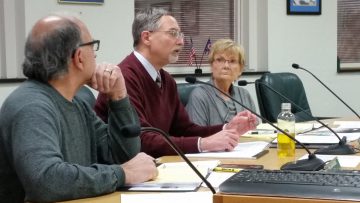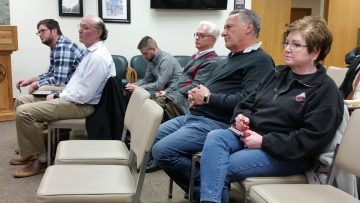By JAN LARSON McLAUGHLIN
BG Independent News
The committee studying food trucks in Bowling Green got a heaping serving of advice from a wide range of food providers Monday evening.
They heard from the owners of a burger bar, family diner, fast food site, and the chef at a country club. They also heard from food truck owners who sell everything from perch and grilled cheese, to grilled lamb chops and lobster macaroni & cheese.
And all of them seemed to want to find a way that brick and mortar restaurants can not only survive, but can benefit from having food trucks in the city.
“I’m here to find out how we have to adapt to compete,” said George Strata, who owns Beckett’s Burger Bar and Call of the Canyon with his wife, Phina Strata. “Competition is good,” as long as it’s fair, he added.
A current city ordinance allows food trucks on private property, but not on public property within 150 feet of a right-of-way. A committee made up of Bowling Green City Council members Bill Herald, Sandy Rowland and John Zanfardino, is studying if those rules should be changed to make it feasible for food trucks to set up in the city.

John Zanfardino, Bill Herald and Sandy Rowland at food truck meeting
Herald asked for input on where trucks should be allowed, the specific hours of operation, the duration of operations, and how many locations may be used? Food truck operators abide by a “code of the road,” Herald said, but some specific rules may be in order.
“We’re in the process of trying to see what’s feasible in town,” Zanfardino said.
Russ Courtney, owner of Rusty’s Roadtrip which sets up weekly in Perrysburg and once a year at the Black Swamp Arts Festival in Bowling Green, suggested that the rules not be made too restrictive.
“If the law gets convoluted enough, people will say, ‘Forget it,’” Courtney said.
The city of Perrysburg has no rules limiting the days of operation, said Phil Barone, owner of Rosie’s Italian Grille, a food truck owner, and president of the area food truck association. The food trucks go to Perrysburg on Thursdays during the weekly farmers markets, and go to Maumee for “Food Truck Fridays.”
“You don’t need to worry about food trucks hanging out,” Barone said. They are too busy, and will only go where there is demand.
“Maumee embraced this,” Barone said. And Perrysburg restaurants are thriving on the farmers market night because the food trucks bring so much business downtown, he said. “It’s really working.”
Rowland said she has spoken with many residents who want food trucks at Bowling Green’s downtown farmers market.
“I think it would bring a lot more people down,” Phina Strata said.
Mary Hinkelman, executive director of the Downtown Bowling Green organization, said a survey of farmers market visitors showed that 85 percent of them would like food at the weekly event held off South Main Street.
But Hinkelman said she is interested in using downtown businesses and some civic groups to feed those attending the Bowling Green market.
“We are looking to those before we would use food trucks,” she said, noting that downtown businesses pay for the farmers market management.
Barone said food trucks are designed to serve in mobile settings, and offer variety. “It’s made fresh right there,” he said. “Food trucks have a draw.”
“What this all comes down to is – what do the people want?” Barone asked.
Herald agreed that Bowling Green residents have been asking for food trucks, “but the people also want a vibrant downtown,” he said.
“Brick and mortar restaurants benefit from food trucks,” Rowland said of the research she has read on the topic.
But Hinkelman said there is also plenty of research that says otherwise.
Barone talked about a brick and mortar restaurant owner in Bowling Green, who can’t operate in the city because of the strict regulations.
“Eric’s Ice Cream has a food truck. He doesn’t operate in town, because he can’t,” Barone said.
“Why not bring Perrysburg people here, bring Maumee people here,” Barone said. Visitors may come for the food trucks, but then they might walk around and discover other businesses to shop at in the downtown, he said.
Courtney suggested that Hinkelman look at food trucks as a way to supplement downtown restaurants at the farmers market.
“We would never expect you to pick us over them,” Courtney said to Hinkelman.

Restaurant and food truck owners share input.
Restaurant owners shared a few other concerns, such as already limited parking downtown.
“My concern is, without the parking, the customers don’t come,” George Strata said. “There’s hardly any parking to start with.”
Another concern was regulations – not too many for food trucks, but enough to make it an even playing field with brick and mortar restaurants.
Larry Ball, owner of both McDonald’s in Bowling Green, said he understands the desire for fewer regulations from the mobile venders. “I would tell you the same thing,” he said.
Phina Strata asked about litter from food trucks, to which Rowland replied that other communities manage to handle that problem.
And Stephen Ball, son of the McDonald’s owner, expressed concerns about already congested streets and the safety of residents if food trucks add to more traffic problems.
Hinkelman suggested that the city consider allowing food trucks in “food deserts,” possibly by BGSU, but not in the downtown area. And she also said the city should set time limits, “otherwise it could be a free-for-all” with the hours kept by college students.
Ryan Noone, the chef at Stone Ridge, said Fort Wayne, Indiana, has a robust food truck program that operates well into the night. That would suit him, Noone said.
“I’m kind of bored with 14 pizza places in Bowling Green after 2 a.m.,” he said.
The next meeting of the committee studying the food truck issue will be Monday, March 19, at 6 p.m., in the City Council chambers.





